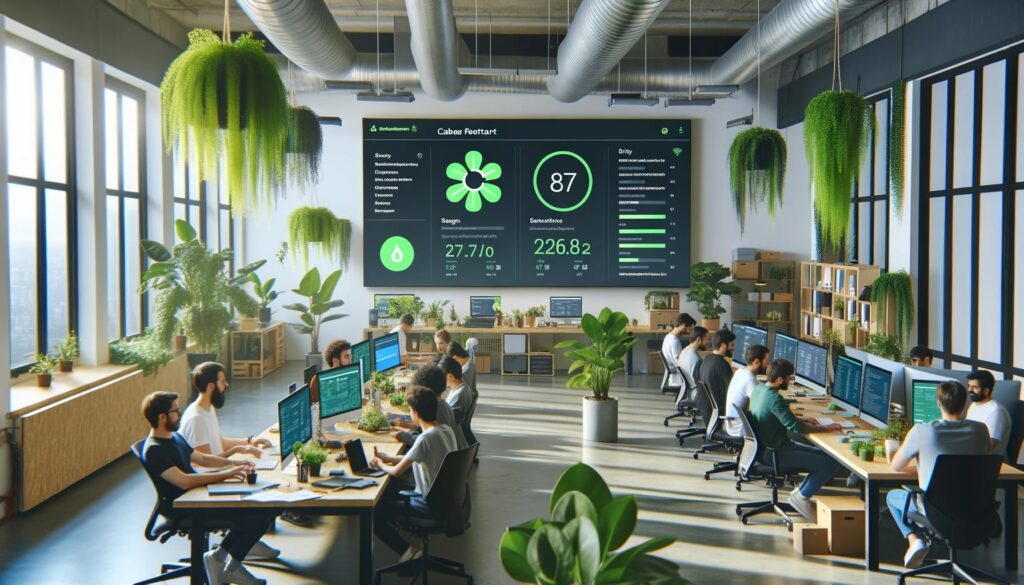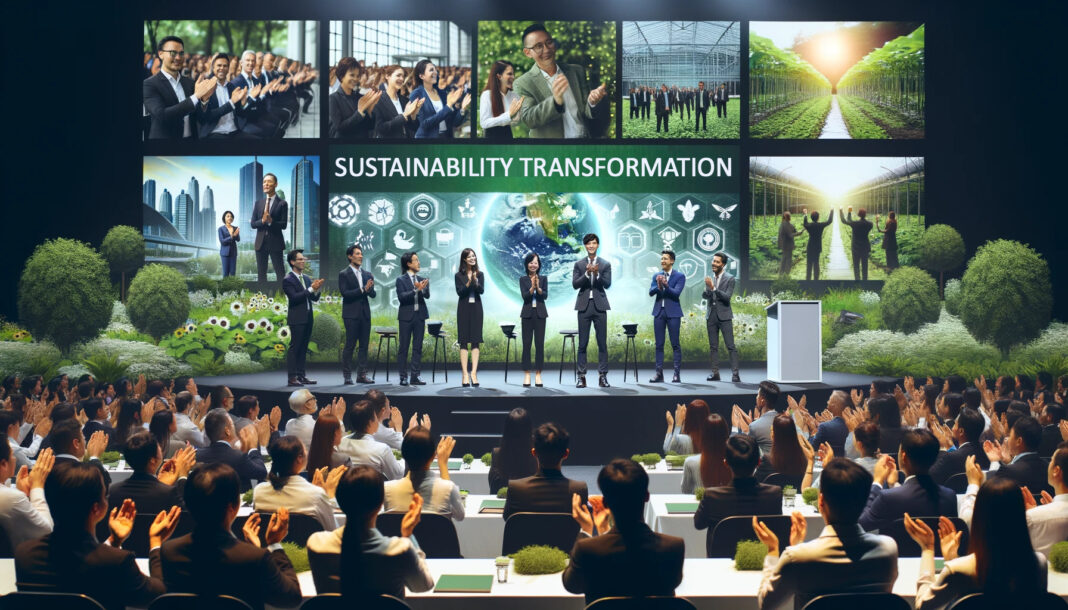Welcome to the era of sustainability transformation, a journey that has reshaped the governance and innovation within the corporate world. This change promises an exciting road ahead for every company committed to sustainable business practices. This shift, known as digital transformation, isn’t just a passing trend but a significant evolution in corporate strategy. It’s a sustainability transformation driven by changes in how businesses operate, influenced by various factors that we’ll explore. So, let’s dive into this transformative concept that’s redefining success in business – sustainability, a cornerstone of strategic planning for a sustainable future. This corporate strategy is infused with innovation.
Sustainability is no longer just a buzzword; it’s become an integral part of modern corporate strategy. This development is shaping the company environment. From small startups to multinational corporations, everyone is striving for business sustainability and sustainability transformation by incorporating recycling practices into their business environment. But what are these key drivers pushing businesses towards a recycling-focused corporate strategy for the environment, led by sustainability leaders? Let’s find out.
Importance of Sustainable Business Practices
Preserving Resources for Future Generations
Sustainable business practices are key to preserving resources. They ensure we don’t exhaust what Mother Nature has given us, through recycling and business sustainability methods, contributing to a sustainability transformation.
For example, a business might opt for renewable energy sources instead of fossil fuels, as part of their sustainability transformation. This recycling scenario could shape a greener future. This recycling practice aids in sustainability transformation, helping to reduce carbon emissions and preserve non-renewable resources, thereby promoting business sustainability through these methods.
Another way a company can contribute to sustainability transformation is through recycling and waste management developments, benefiting the environment. Instead of dumping waste, businesses could embrace recycling and sustainability transformation, driving business sustainability for the future by recycling materials or adopting zero-waste policies.
Enhancing Brand Reputation and Customer Loyalty
In today’s world, green is the new black! Consumers are becoming more conscious about the environment. They prefer brands that care about the planet.
Companies implementing sustainability transformation and recycling practices find themselves in customers’ good books, benefiting the environment. These recycling practices enhance the company’s brand reputation in the business environment and foster customer loyalty, as appreciated by business leaders.
A Nielsen report showed that 66% of consumers would spend more on a product if it comes from a sustainable brand. This insight is crucial for business leaders operating in today’s business environment, as they plan for the future with strategic foresight. That’s a huge chunk!
Boosting Employee Morale and Retention
Who doesn’t want to work for an organization with business leaders that care about the future business environment and strategy? Sustainable business practices aren’t just good for the environment; they’re also great for employees and the future.

When businesses demonstrate their commitment to the environment and future through sustainability, it elevates employee morale. Employees feel proud to be part of a business led by future-focused leaders that take responsibility towards the environment.
Moreover, these practices play a significant role in employee retention too, within the business environment. They are often implemented by business leaders, shaping the future. A study by Cone Communications revealed that 74% of employees say their job is more fulfilling when they have opportunities to make a positive impact on social and environmental issues, shaping the future.
So, there you have it! The importance of sustainable business practices goes beyond being eco-friendly—it influences brand reputation, customer loyalty, and employee satisfaction too!
Remember: Sustainability isn’t just a buzzword—it’s our ticket to preserving resources for future generations while building successful businesses today.
Profitability Through Sustainability in Business
Link Between Sustainability and Increased Profitability
Sustainability isn’t just a buzzword. It’s a powerful tool that can help businesses increase their profits. A sustainable business environment offers a competitive advantage. By focusing on sustainability in the business environment, companies can innovate and create new opportunities.
Take the example of Patagonia, an outdoor clothing company. They’ve built their brand around sustainability and are thriving in the market. Their products are made from recycled materials, reducing harm to the environment.
“Recycling as a Sustainable Business Strategy”
Understanding Recyclings Role in Sustainability
Recycling is more than just a buzzword. It’s a crucial part of sustainable business practices. Companies worldwide are realizing that it’s not enough to do business; they need to do it sustainably.
Recycling plays an essential role here. It helps reduce waste, conserve resources, and decrease pollution. But it’s not just about saving the planet; recycling can also give businesses a competitive edge.
Current State and Trends in Sustainability
Global Trends Shaping Business Sustainability
Climate change is no longer a distant alarm. It’s real, it’s here, and it’s high time businesses step up their game.
We’re seeing a shift towards sustainable business practices globally. Companies are now understanding that sustainability isn’t just about saving the world; it’s also about staying relevant in a rapidly changing business landscape.
-
For instance, renewable energy is on the rise as businesses aim to reduce their carbon footprint.
-
More companies are investing in circular economy models, focusing on reducing waste and reusing resources.
-
There’s also an increasing emphasis on ethical sourcing and fair trade practices.
These trends show that sustainability is becoming integral to business strategies worldwide.
Adoption of Sustainable Practices Across Industries
Different industries are jumping on the sustainability bandwagon too. And they’re doing so in unique ways that align with their specific context.
Take the fashion industry for example. Known for its wastefulness, many brands are now embracing sustainable fabrics and ethical manufacturing processes.
Similarly, the food industry is shifting towards organic farming methods and reducing food waste. Even tech giants like Apple and Google are striving for carbon neutrality by harnessing renewable energy sources.
In essence, every industry has a role to play in creating a sustainable future. And it seems they’re finally starting to take this responsibility seriously.
Regulatory Changes Impacting Business Sustainability
Regulations can be game-changers. Governments around the world have started tightening the reins on environmental issues.
For example:
-
The European Union has implemented strict regulations regarding single-use plastics.
-
Many countries have set ambitious targets for reducing greenhouse gas emissions.
-
Some regions have even introduced carbon pricing mechanisms to incentivize businesses to reduce emissions.
Such regulatory changes push companies towards more sustainable operations. They ensure that businesses not only talk the talk but also walk the walk.
Strategic Foresight for Future Sustainability
The Significance of Strategic Foresight
Strategic foresight is a big deal. It’s like having a crystal ball that gives you a peek into the future.
Businesses need this kind of perspective to stay ahead of the curve. You don’t want to be caught off guard when the tide turns, do you?
Harnessing Foresight Techniques
So, how can businesses use foresight techniques? Well, there’s no one-size-fits-all answer here.
-
Some might use scenario analysis. This involves creating different potential scenarios and figuring out how to respond to each.
-
Others could take the long-term approach by drafting an ESG policy document. This helps them outline their environmental, social, and governance (ESG) goals for the future.
-
There are also those who rely on strategic planning sessions with their team members. These brainstorming sessions can help generate fresh ideas and perspectives.
Each business will have its own unique way of using foresight techniques. The key is finding what works best for your company.
Tech’s Role in Enabling Foresight
Technology plays a crucial role in enabling strategic foresight for sustainability. Think about it: without tech tools, gathering data would be like trying to find a needle in a haystack!
For example, companies can use data analytics tools to analyze trends and patterns over time. This could help them anticipate changes in consumer behavior or market conditions.
Artificial Intelligence (AI) is another game-changer in this space. AI algorithms can sift through massive amounts of data quickly and accurately, helping businesses make informed decisions.
Transformations Towards Sustainable Business
Let’s get down to business. We’re talking about key transformations needed for sustainable operations, success stories of significant changes, and the barriers we might face along the way.
The Need for Sustainability Transformation
Companies worldwide are feeling the heat. It’s not just about making a profit anymore. Sustainability is now a major factor in business strategy.
Digital transformation is leading this charge. It’s like having a superpower that allows businesses to reduce waste, optimize resources and minimize their carbon footprint. Think about it – digital documents instead of paper, virtual meetings instead of travel, cloud storage instead of physical servers – all these contribute towards sustainability.
But it’s not just about going digital. Businesses need to fundamentally change how they operate. This means rethinking supply chains, product designs, manufacturing processes – everything really.
Success Stories Worth Celebrating
It’s easy to talk the talk but walking the walk is where it gets real. Thankfully there are leaders out there showing us how it’s done.
Take Interface Inc., for example. They’ve committed to becoming carbon neutral by 2020 and guess what? They did it! Their transformation involved redesigning products, investing in renewable energy and even creating a program for recycling old carpet tiles.
Or consider Unilever with its “Sustainable Living” plan. They’ve made huge strides in reducing environmental impact while doubling their business size!
These are no small feats folks! These companies have shown that change is possible if you’re willing to take the plunge.
Barriers and Solutions: A Realistic Look
Now don’t get me wrong – this shift towards sustainability ain’t a walk in the park. There are barriers galore!
Costs can be high especially when you’re talking about new technologies or infrastructure changes. And let’s not forget resistance from employees who may be comfortable with current practices.
The key here is persistence and creativity in finding solutions. Government incentives can help offset costs. Training programs can help employees embrace new ways of working.
In the end, the drivers pushing us towards sustainable business practices are too powerful to ignore. Consumers demand it, regulations require it and our planet definitely needs it.
The road ahead might be challenging but remember – every journey starts with a single step. So let’s start stepping!
Predicting the Sustainable Business Future
So, you’ve taken a deep dive into the world of sustainable business practices. You’ve seen how going green can mean more green in your pocket, and how recycling isn’t just good for Mother Earth – it’s savvy business too. We’ve peeked into the future, and guess what? It’s looking pretty sustainable.
But don’t just take our word for it. It’s time to hit the ground running! Start implementing these strategies and witness firsthand how sustainability can revolutionize your business game. Remember, every little step counts on this road to a greener future.
Frequently Asked Questions
Can implementing sustainable practices really boost my profits?
Absolutely! Many companies have reported increased profitability after adopting sustainable practices. This is often due to operational efficiencies, improved brand reputation, and customer loyalty.
Is recycling an effective strategy for all types of businesses?
While the specifics may vary depending on your industry, recycling can be beneficial for almost any type of business by reducing waste disposal costs and conserving resources.
What are some trends in sustainability I should be aware of?
Some key trends include circular economy models, renewable energy sources, corporate social responsibility initiatives, and transparency in reporting sustainability efforts.
How can I predict future sustainability trends relevant to my business?
Strategic foresight involves researching current trends, analyzing potential impacts on your industry or market segment, and developing plans based on those insights.
What does transformation towards sustainable business involve?
This typically involves rethinking your business model with sustainability at its core – from sourcing materials responsibly to optimizing operations for efficiency and minimizing waste.
